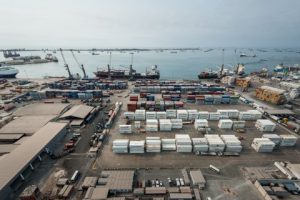(ThyBlackMan.com) Before the $1.1 billion Porto de Caio came to northwest Angola, Pedro Cardoso had a wife and a son, but no job and little hope. The family got by only on what Cardoso’s father gave him. His story is achingly familiar in the impoverished Cabinda province.
But now, thanks to the deep-water port project, Cardoso is a master painter. Now, he said, “I am the one providing food for my wife and son.”
Porto de Caio will be the first deep-water port in Angola, a West African nation on the Atlantic Ocean. When finished, it will be a 6,200-acre complex capable of simultaneously docking four vessels. Its 50-foot-deep channel will be able to accommodate some of the  world’s largest ships. The port also has free trade and industrial zones. Their goal: economic growth and diversification away from an oil-based economy.
world’s largest ships. The port also has free trade and industrial zones. Their goal: economic growth and diversification away from an oil-based economy.
As a new gateway for local, regional and global trade, the Port is expected to increase employment in the Cabinda region of Angola by 10 percent-to-16 percent. It will add approximately 1,600 new jobs directly within the project and an estimated 30,000 indirect jobs along the supply chain.
The port is also viewed as a game changer for Angola and West Africa. Its integrated industrial zones, services and logistics corridors will raise living standards and create opportunities for Angolans by reducing the cost of imported goods, which today represent 85 percent of all goods in Angola. In addition, it will increase the province’s Gross Domestic Product by at least 20 percent.
Its first construction phase, which is being built by China Road and Bridge Corporation using local workers, is on track to begin operating by the end of 2018. The economic zones surrounding the Port are designed to attract businesses, which have the potential to raise up to $350 million in tax revenues when the project is fully operational.
Porto de Caio is a public-private partnership, the first of its kind in Angola. It fits the country’s goal of investing in long-term economic growth while at the same time reducing the state’s short-term capital outlay and minimizing risk.
Like other major African economies, much of Angola’s economy is reliant on oil. Sixty percent of that oil comes from Cabinda, some 900,000 barrels per day. Yet Cabinda is one of the poorest provinces in Angola. It is a paradox that is all-too familiar in the world’s major oil-based economies.
The port’s neighbors are excited at the prospects. File Matoco Boma, a local leader of the Buco–Zau municipality near the port said, “This is a project that people have been waiting for.” As an enclave of Angola, Cabinda is surrounded by the two Congos (the Republic of the Congo and the Democratic Republic of the Congo) and physically separated from Angola, which has always created a sense of economic isolation there. “The port will change that. It has the power to bring back people’s hope,” he said.
Marta da Conceição Lelo, the County Major of Buco–Zau, said residents of Cabinda are eager to see the port completed because it will boost development of the province. “If it is really erected as it is designed, it will bring added value to the province,” she said.
Faustino Vieira Landazi, a local leader on the Caio Coast where the port will operate, says his hope is to reduce Cabinda’s high unemployment rate. “This can lead to great opportunities for the sustaintable development of the country,” he said.
The economic zones – some designated for international companies, others for domestic and international companies – will provide new products and services for Angolans and new markets for their goods. For José Casemiro, president of the local Fisherman’s Association, said the port “will bring happiness to a population that has long waited for this.”
Porto de Caio may be the economic engine that turns around Cabinda’s fate, unlocking the potential of thousands of people and transforming its economic fortunes. For master painter Pedro Cardoso, it means something more modest but no less profound: food for his family and hope for their future. A lot is riding on its success.
Staff Writer; Lloyd Green
One may also connect with this brother via Twitter; Lloydgreen9.

















Leave a Reply